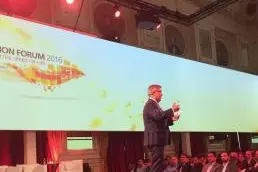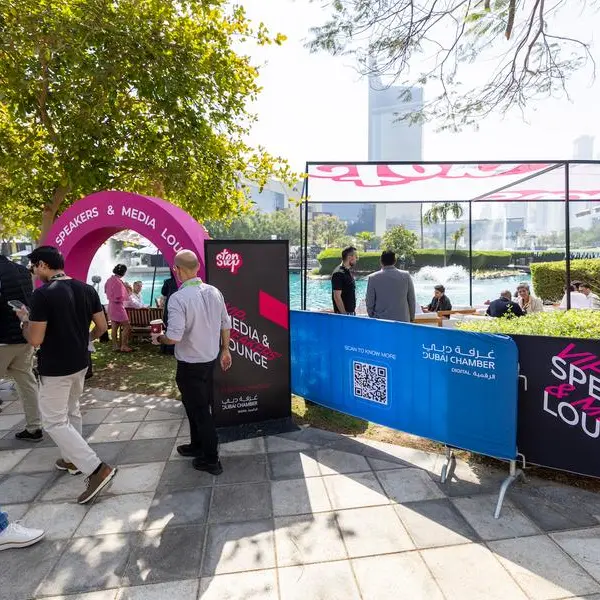PHOTO
The comprehensive cross-country study assesses attitudes and appetite for digital in all areas of life
To tweet this news, copy and paste news.mstr.cd/2dbyA7v to your Twitter feed with the hashtag #MastercardInnovates
Dubai, United Arab Emirates - Mobile phones are the most commonly used device among consumers in the UAE and more than half of all consumers (59%) prefer using their smartphones over any other device to make payments, the new Mastercard Impact of Innovation Study reveals.
The study surveyed 23,000 consumers in 23 different countries across the Middle East, Africa and Europe about their attitudes to digital technology. It found that while in Africa and the Middle East over 70% said they were ready to pay with their smartphones, Western Europeans have some way to go - only two fifths (40%) said so. However, when asked about new ways to pay, consumers across all regions chose their smartphone as an alternative to the plastic card.
The study was released on the sidelines of the Mastercard Innovation Forum 2016, which opened today in Budapest, Hungary with the participation of more than 500 attendees from the Middle East and Africa, Central and Eastern Europe, Russia, Turkey and Ukraine.
"The study points to how digital technology is reshaping the payment landscape in the UAE and impacting all areas of everyday life," said Khalid Elgibali, Division President for Middle East and North Africa, Mastercard. "Smartphones have become an indispensable part of consumers' daily lives and this has given rise to a new breed of mobile-first and mobile-only users, who rely on their phones for a variety of purposes including making payments. The findings of the study underscore this growing consumer appetite for new and better ways to pay. The trend of consumers replacing cash and cards with phones also affirms the UAE's reputation as one of the most tech-ready countries in the world."
On the whole, consumers in the UAE have a positive attitude towards digitalization and innovation and are optimistic about the potential of digital technologies to improve their lives, the study showed.
Public education, healthcare and public transport were identified as the areas where improvements in digital services are most needed. Guarantees for data protection and education and awareness on both usage and advantages of digital services, meanwhile, were cited by study respondents as the most important factors for boosting digital penetration in the UAE.
Speed, convenience and simplicity are the main attractions for consumers to shop online as well as to use payment applications. The study found that education has the strongest influence on the usage of digital services, with emailing, Internet telephony and social media are all being used by the highly educated in a significantly higher ratio.
Notably, two out of five consumers in the UAE call themselves 'eager promoters' of new technology - a relatively high share compared to other countries. People in the Middle East and Africa were generally found to demand more innovation in all areas.
Consumers positive on the future of technology
Almost two thirds (60%) across regions think digital innovations are a good thing, and have a positive outlook on the future of technology. Only 5% of people say they think digital innovations are having a negative impact.
The study results also indicate that consumers who live in technologically less developed countries tend to be more enthusiastic about digital innovation than in markets where it is readily available. Western Europe has the largest ratio of those resistant to digital change (17%), while Central and Eastern European countries and those in the Middle East and Africa have the highest number who actively embrace new technology.
While enthusiastic about innovation, consumers across regions want security, especially when it comes to making payments. Consumers unanimously agreed that bank account security is their absolute priority when it comes to digital payments, followed by the security of their personal data. They also value the speed and simplicity of the payment process.
Mastercard Impact of Innovation Study - Key Findings
Western Europe (France, Germany, Italy, Sweden and the UK)
· Consumers in Western Europe tend to be moderate when it comes to digital innovation.
· Larger proportions of 'resistants' (17%) are paired with a lower rate of 'eager promoters' (11%).
· The percentage of people ready to pay by smartphone is around 40%; however, Sweden stands out - over 70% are ready.
· Western Europeans trust biometric authentication such as fingerprint (38%) more than they trust PIN (30%).
Central and Eastern Europe (Austria, Bulgaria, Czech Republic, Croatia, Hungary, Poland, Romania, Serbia and Slovakia)
· Central and Eastern Europe occupies the middle ground in many aspects, with the highest rate of 'drifting followers' (46%) similar to Western Europe, but with a much lower rate of 'resistants' (11%).
· Mobile payment readiness is 57%, and fingerprint authentication (37%) is trusted more than PIN (33%).
Russia, Ukraine, Turkey
· Regarding the further spread of digital services, Russia, Ukraine and Turkey are the most positive; 4 out of 5 consumers think that they will be available for more people in the future.
· Mobile payment readiness is an average 64%, and this region boasts the highest number of 'eager promoters'; an impressive 27%.
· People from these countries trust fingerprint the least - only 30% said so, but they still prefer it to PINs. SMS code leads with 40%.
· Demand exists for more innovation in automobile and transport industries.
Middle East & Africa (the Kingdom of Saudi Arabia, the United Arab Emirates, Egypt, Kenya and South Africa)
· Consumers in the Middle East and Africa are optimistic about the effects of digitalization and more open towards innovative solutions.
· Mobile payment readiness is the highest at 73% and the region has the highest ratio of enthusiastic followers (33%).
· People in this region do not generally trust PIN codes for payment (20%); however, fingerprint enjoys more confidence (30%) and the list is topped by SMS code (40%).
· This region demands innovation in most areas; not only education, healthcare and transport, but also in commerce, finance, automobile, hotel and restaurant industries.
-Ends-
About Mastercard Impact of Innovation Study:
The Mastercard Impact of Innovation Study looked into the perception of digitalization and its effects on society, personal preferences in using digital technology for payment and payment authentication. It also showed how resistant or willing respondents were in accepting and actively using digital technologies.
The study was commissioned by Mastercard and carried out by IPSOS Research in the summer of 2016. The study gathered data from internet users with bank accounts between the age of 20-50 in Mastercard's four global regions: Western Europe (countries: France, Germany, Italy, Sweden and the UK); Central and Eastern Europe (countries: Austria, Bulgaria, Czech Republic, Croatia, Hungary, Poland, Romania, Serbia and Slovakia); Russia, Ukraine* and Turkey*; and the Middle East and Africa (countries: the Kingdom of Saudi Arabia, the United Arab Emirates, Egypt*, Kenya* and South Africa*). In countries marked with * above, the study is representative of Internet users, while in all the other countries the study is representative of the whole population.
Sample Structure: N=1,000 respondents per country, representative sample of 20-50 aged online urban population by gender, age and region.
Methodology: online self-completed interviews via IPSOS access panel.
Questionnaire: 20-minute self-completed online questionnaire.
About Mastercard:
Mastercard (NYSE: MA), www.mastercard.com, is a technology company in the global payments industry. We operate the world's fastest payments processing network, connecting consumers, financial institutions, merchants, governments and businesses in more than 210 countries and territories. Mastercard products and solutions make everyday commerce activities - such as shopping, traveling, running a business and managing finances - easier, more secure and more efficient for everyone. Follow us on Twitter @MastercardMEA and @MastercardNews, join the discussion on the Beyond the Transaction Blog and subscribe for the latest news on theMEA Engagement Bureau.
Mastercard Communications Contact
Omar Abuhanoud, +971 4 563 8603
omar.abuhanoud@mastercard.com
Aladin Aburamadan, +971 55 9949769
aladin.aburamadan@traccs.net
© Press Release 2016



















